This article needs additional citations for verification .(June 2022) |
A library website provides a library with a website to offer its services and to tell its story to its community.
This article needs additional citations for verification .(June 2022) |
A library website provides a library with a website to offer its services and to tell its story to its community.
Library websites can offer: [1]
The examples and perspective in this section deal primarily with the United States and do not represent a worldwide view of the subject.(April 2016) |
In the United States, according to the Tech Act and AT Act of 1998, libraries as grant-funded institutions are bound by the Section 508 Amendment to the Rehabilitation Act of 1973 and must report the accessibility of their electronic and information technology. Therefore, library websites should be designed with web accessibility standards in mind. [2] Search & download free books [3]
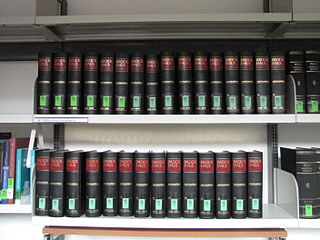
A reference work is a non-fiction work, such as a paper, book or periodical, to which one can refer for information. The information is intended to be found quickly when needed. Such works are usually referred to for particular pieces of information, rather than read beginning to end. The writing style used in these works is informative; the authors avoid use of the first person, and emphasize facts.

In 1998, the U.S. Congress amended the Rehabilitation Act to require federal agencies to make their electronic and information technology accessible to people with disabilities. Section 508 was enacted to eliminate barriers in information technology, to make available new opportunities for people with disabilities and to encourage the development of technologies that will help achieve these goals. The law applies to all federal agencies when they develop, procure, maintain, or use electronic and information technology. Under Section 508, agencies must give employees with disabilities and members of the public access to information that is comparable to the access available to others.

A public library is a library, most often a lending library, that is accessible by the general public and is usually funded from public sources, such as taxes. It is operated by librarians and library paraprofessionals, who are also civil servants.
The Perseus Digital Library, formerly known as the Perseus Project, is a free-access digital library founded by Gregory Crane in 1987 and hosted by the Department of Classical Studies of Tufts University. One of the pioneers of digital libraries, its self-proclaimed mission is to make the full record of humanity available to everyone. While originally focused on the ancient Greco-Roman world, it has since diversified and offers materials in Arabic, Germanic, English Renaissance literature, 19th century American documents and Italian poetry in Latin, and has sprouted several child projects and international cooperation. The current version, Perseus 4.0, is also known as the Perseus Hopper, and is mirrored by the University of Chicago.

A librarian is a person who works professionally in a library providing access to information, and sometimes social or technical programming, or instruction on information literacy to users.

Accessibility is the design of products, devices, services, vehicles, or environments so as to be usable by people with disabilities. The concept of accessible design and practice of accessible development ensures both "direct access" and "indirect access" meaning compatibility with a person's assistive technology.
Digital reference is a service by which a library reference service is conducted online, and the reference transaction is a computer-mediated communication. It is the remote, computer-mediated delivery of reference information provided by library professionals to users who cannot access or do not want face-to-face communication. Virtual reference service is most often an extension of a library's existing reference service program. The word "reference" in this context refers to the task of providing assistance to library users in finding information, answering questions, and otherwise fulfilling users’ information needs. Reference work often but not always involves using reference works, such as dictionaries, encyclopedias, etc. This form of reference work expands reference services from the physical reference desk to a "virtual" reference desk where the patron could be writing from home, work or a variety of other locations.
Library collection development is the process of systematically building the collection of a particular library to meet the information needs of the library users in a timely and economical manner using information resources locally held as well as resources from other organizations.
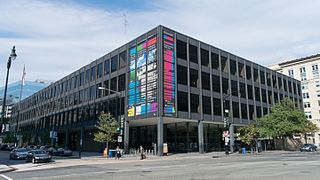
The Martin Luther King Jr. Memorial Library (MLKML) is the central facility of the District of Columbia Public Library (DCPL), it was constructed and named in honor of the American civil rights leader Dr. Martin Luther King Jr. It is located in the 901 G St. NW in Downtown Washington, D.C., with its main entrance between 9th and 10th St. in the opposite corner of Gallery Place station, and the Smithsonian American Art Museum. The library is located in and around the Chinatown, Mount Vernon Square, and Penn Quarter neighborhoods.

The Rehabilitation Act of 1973 is a United States federal law, codified at 29 U.S.C. § 701 et seq. The principal sponsor of the bill was Rep. John Brademas (D-IN-3). The Rehabilitation Act of 1973 replaces preexisting laws to extend and revise the authorization of grants to States for vocational rehabilitation services, with special emphasis on services to those with the most severe disabilities, to expand special Federal responsibilities and research and training programs with respect to individuals with disabilities, to establish special responsibilities in the Secretary of Health, Education, and Welfare for coordination of all programs with respect to individuals with disabilities within the Department of Health, Education, and Welfare, and for other purposes.
PAS 78: Guide to good practice in commissioning accessible websites is a Publicly Available Specification published on March 8, 2006, by the British Standards Institution in collaboration with the Disability Rights Commission. It provides guidance to organisations in how to go about commissioning an accessible website from a design agency. It describes what is expected from websites to comply with the UK Disability Discrimination Act 1995, making websites accessible to and usable by disabled people.
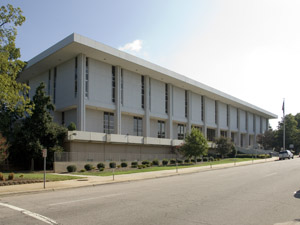
The State Library of North Carolina is an institution which serves North Carolina libraries, state government employees, genealogists, and the citizens of North Carolina. The library is the main depository for North Carolina state publications and serves the needs of North Carolina government agencies and state government employees by providing access to information resources that are vital to public decision-making and economic development.
A digital library, also called an online library, an internet library, a digital repository, a library without walls, or a digital collection, is an online database of digital objects that can include text, still images, audio, video, digital documents, or other digital media formats or a library accessible through the internet. Objects can consist of digitized content like print or photographs, as well as originally produced digital content like word processor files or social media posts. In addition to storing content, digital libraries provide means for organizing, searching, and retrieving the content contained in the collection. Digital libraries can vary immensely in size and scope, and can be maintained by individuals or organizations. The digital content may be stored locally, or accessed remotely via computer networks. These information retrieval systems are able to exchange information with each other through interoperability and sustainability.
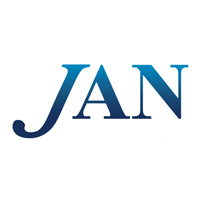
The Job Accommodation Network (JAN) is a service provided by the United States Department of Labor's Office of Disability Employment Policy (ODEP). JAN is one of several ODEP technical assistance centers. JAN facilitates the employment and retention of workers with disabilities by providing employers, employment providers, people with disabilities, their family members, and other interested parties with information on job accommodations, entrepreneurship, and related subjects. JAN's efforts are in support of the employment, including self-employment and small business ownership, of people with disabilities.
Knowbility is an American non-governmental organization based in Austin, Texas, working to support the independence and empowerment of people with disabilities by promoting the use and improving the availability of accessible information technology. Its mission is to create an inclusive digital world for people of all abilities. Knowbility's signature program is the Accessibility Internet Rally, a web-building competition that brings together volunteer web designers to create accessible websites for nonprofit organizations and artists that serve communities all over the world.
A distance education librarian or distance learning librarian is a specialized academic librarian whose primary duties involve serving the information needs of distance education students, faculty, and staff. This position typically involves coordinating the duties of many librarians and library staff to ensure adequate access to library resources for those who enroll in and teach distance education courses.

The Catalog of Digital Historical Newspapers (NewspaperCat) is a free online resource for open-access digitized historical newspapers published in North America and the Caribbean. NewspaperCat was developed from a grant by the George A. Smathers Libraries at the University of Florida and is powered by SobekCM, the content management system used by the University of Florida Digital Collections.

The Kropyvnytskyi Regional Universal Research Library (RURL) is one of the oldest research libraries in Ukraine and the largest in the region. The library was named after D.I. Chyzhevskyi. It has universal books and documents on traditional and modern media. It houses collections of precious and rare publications and is the depositary of publications on local lore.
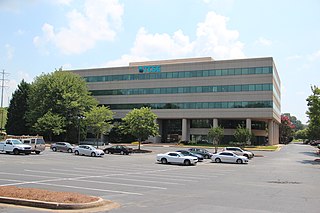
The Georgia Public Library Service (GPLS) is the state agency for libraries in the U.S. State of Georgia and a unit of the University System of Georgia. The service was initially founded in 1996 after the inception of the Library Services and Technology Act (LSTA), and in July 2000 moved from the Georgia Department of Technical and Adult Education (DTAE) to the Georgia Board of Regents and University System of Georgia. Julie Walker is the current State Librarian.
The Florida Electronic Library (FEL) was founded in 2003 to provide nearly 200 million articles, ebooks, and other digital resources to the citizens of Florida. The FEL partners with Florida's public libraries in order to enhance the availability of resources and services to patrons.